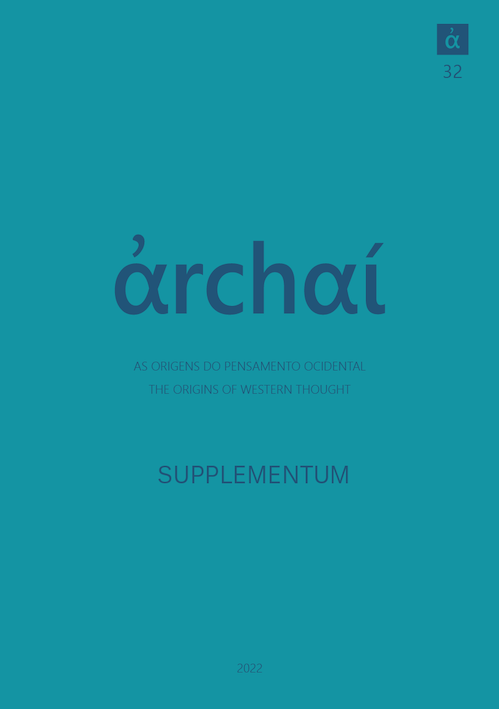“Cutting Them Down to Size”: Humbling and Protreptic in Plato’s Lysis
DOI:
https://doi.org/10.14195/1984-249X_32_38Palavras-chave:
Humbling, Protreptic, Elenchus, Method, SocratesResumo
This article examines the role that humbling plays in Socratic practice. Specifically, we consider how Socrates humbles his interlocutors in order to turn them towards the pursuit of philosophical friendship. We argue against a standard interpretation of humbling in the Lysis, which holds that Socrates humbles Lysis by exposing his own ignorance to him at 210d. Instead, we argue that the humbling occurs not when Lysis is (allegedly) made aware of his own ignorance, but at 222d near the end of the dialogue, when Lysis is made to think that he is not as good a friend as he thought he was. On this reading, Socrates humbles Lysis not by exposing to him his ignorance about theoretical matters but by suggesting to him that he may be not the sort of person he thought he was.
Downloads
Referências
AHBEL-RAPPE, S. (2018). Socratic Ignorance and Platonic Knowledge in the Dialogues of Plato Albany, State University of New York Press.
BELFIORE, E. (2012). Socrates’ Daimonic Art: Love for Wisdom in Four Platonic Dialogues Cambridge, Cambridge University Press.
COOPER, J. (ed.) (1997). Plato. Complete Works Indianapolis, Hackett Publishing Company.
DANZIG, G. (2010). Apologizing for Socrates: How Plato and Xenophon Created Our Socrates Lanham, Lexington Books.
GONZALEZ, F. (1995). Plato’s Lysis: An Enactment of Philosophical Kinship. Ancient Philosophy 15, p. 69-90.
GONZALEZ, F. (2000). Socrates on Loving One's Own: A Traditional Conception of PHILÍA Radically Transformed. Classical Philology 95.4, p. 379-398.
GONZALEZ, F. (2003). How to Read a Platonic Prologue: Lysis 203a-207d. In: MICHELINI, A. (ed.), Plato as Author: The Rhetoric of Philosophy Leiden, Brill, p. 15-44.
LEAR, J. (2009). The Socratic Method and Psychoanalysis. In: AHBEL-RAPPE, S.; KAMTEKAR, R. (eds.). A Companion to Socrates Chichester, Wiley-Blackwell, p. 442-462.
LOCKWOOD, T. (2017). Do Lysis’ Parents Really Love Him? Non-argumentative Arguments in Plato’s Lysis Ancient Philosophy 37.2, p. 319-332.
LUALDI, M. (1974). Il problema della philia e il Liside platonico Milan, Celuc Libri.
PENNER, T.; ROWE, C. (2005). Plato’s Lysis. Cambridge, Cambridge University Press .
REEVE, C. D. C. (ed.). (2006). Plato on Love: Lysis, Symposium, Phaedrus, Alcibiades, with Selections from Republic and Laws Indianapolis, Hackett.
REEVE, C. D. C. (2016). Plato on friendship and Eros ZALTA, E. N. (ed.), Stanford Encyclopedia of Philosophy (Summer Edition). Stanford University. Available at https://plato.stanford.edu/archives/sum2016/entries/plato-friendship/
» https://plato.stanford.edu/archives/sum2016/entries/plato-friendship/
RIDER, B. (2011). A Socratic Seduction: Philosophical Protreptic in Plato’s Lysis. Apeiron 44, p. 40-66.
RUDEBUSCH, G. (2004). True Love Is Requited: The Argument of Lysis 221d-222a. Ancient Philosophy, 24, p. 67-80.
TESSITORE, A. (1990). Plato’s Lysis: An Introduction to Philosophical Friendship. Southern Journal of Philosophy 28.1, p. 115-132.
TINDALE, C. (1984). Plato’s Lysis: A Reconsideration. Apeiron 18.2, p. 102-109.
VERSENYI, L. (1975). Plato’s Lysis. Phronesis 20, p. 185-198.
VLASTOS, G. (1994). Socratic Studies ed. Myles Burnyeat. Cambridge, Cambridge University Press .
WOLFSDORF, D. (2007). Philía in Plato's Lysis Harvard Studies in Classical Philology 103, p. 235-259
Downloads
Publicado
Como Citar
Edição
Seção
Licença
Copyright (c) 2023 Trevor Anderson, Reid Comstock

Este trabalho está licenciado sob uma licença Creative Commons Attribution 4.0 International License.
Dado o acesso público desta revista, os textos são de uso gratuito, com obrigatoriedade de reconhecimento da autoria original e da publicação inicial nesta revista. O conteúdo das publicações é de total e exclusiva responsabilidade dos autores.
1. Os autores autorizam a publicação do artigo na revista.
2. Os autores garantem que a contribuição é original, responsabilizando-se inteiramente por seu conteúdo em caso de eventual impugnação por parte de terceiros.
3. Os autores garantem que a contribuição que não está em processo de avaliação em outras revistas.
4. Os autores mantêm os direitos autorais e concedem à revista o direito de primeira publicação, sendo o trabalho licenciado sob a Creative Commons Attribution License-BY.
5. Os autores têm permissão e são estimulados a publicar e distribuir seu trabalho on-line após a publicação na revista.
6. Os autores dos trabalhos aprovados autorizam a revista a, após a publicação, ceder seu conteúdo para reprodução em indexadores de conteúdo, bibliotecas virtuais e similares.
7. É reservado aos editores o direito de proceder ajustes textuais e de adequação do artigo às normas da publicação.



